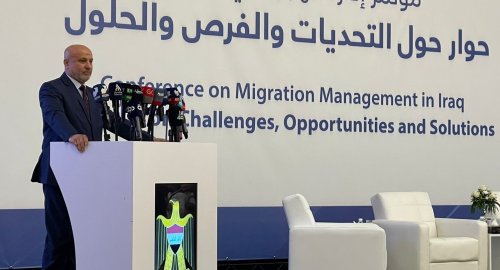
PM Adviser: The government worked to combat and eliminate the causes of migration outside Iraq

- 8-06-2024, 13:32
Baghdad-INA
Prime Minister’s Advisor for Human Rights Affairs, Zidane Khalaf, detailed on Saturday, the government’s measures to end the issue of internal and external displacement, while confirming that the government worked to combat and eliminate the causes of migration outside Iraq.
Khalaf said, at the Immigration Management Conference in Iraq, attended by the Iraqi News Agency (INA) reporter: “Iraq has witnessed, over the past years, the migration of many Iraqi citizens, including scientific and literary competencies, outside Iraq due to wars, terrorism, and the difficult circumstances that Iraq has witnessed, so the curriculum included the government program’s priorities are to benefit from the capabilities of the Iraqi community in Diaspora countries and try to return them to Iraq.”
He pointed out that "the government has placed the rights of the Iraqi citizen as a priority, including education, health, social care, combating poverty, providing job opportunities, the rights of women and children, and voluntarily ending the file of internal displacement by creating appropriate conditions for the return of the displaced to their cities, rebuilding the liberated cities, and ensuring the present and future of the components."
Khalaf continued: "The government worked to combat and remove the reasons that push some Iraqis to migrate outside Iraq, and through our work as an advisor to the Prime Minister for human rights and head of the Sinjar and Nineveh Plain Reconstruction Fund, we would like to show you the interest of the President and the Prime Minister's Office in these steps that he has taken in cooperation with all sectoral bodies, especially the Ministry of Immigration and Displacement, to end the issue of internal displacement in Iraq, which is the most important cause of migration outside Iraq, and to return the displaced voluntarily to their liberated areas, of which the displaced Yazidis in Sinjar district currently represent the largest portion of them.”
He added: “Among these steps taken by the Prime Minister’s Office are:
First: The issuance of Cabinet Resolution No. 24/7, which included the formation of a committee responsible for closing the camps and the voluntary return of the displaced, headed by the Minister of Immigration and Displacement and membership of the relevant authorities, which included paragraphs that addressed the challenges that hinder the return of the displaced, such as addressing the issue of loss of identification documents, accelerating security audit procedures, providing job opportunities, and allocating A percentage of the job contracts allocated to the Ministry and the concerned authorities for those returning from displacement, and increasing the amount of return grants to 4 million for each family from the displacement camps, and directing the Liberated Areas Reconstruction Fund and the Sinjar and Nineveh Plain Reconstruction Fund to build homes for the returnees, in addition to increasing those covered by social welfare and other measures.
Second: Working to open all service departments in Sinjar district and its affiliated districts in accordance with the directives of the Prime Minister, while working to provide job cadres for these departments by allocating approximately 1,000 job contract positions from the contracts allocated to Nineveh Governorate.
Third: Following up on all lagging service projects that have been suspended in all liberated areas, including Sinjar District during our visit to Nineveh Governorate, more than 31 lagging projects have been initiated in Sinjar District, and the coming days will be the launch of many projects in Sinjar District through the Sinjar Fund and the Nineveh Plain.
Fourth: Activating the Yazidi Women Survivors Law No. 8 of 2021 by increasing the number of those covered by the monthly salary for male and female survivors to reach more than 2,000 currently covered by this salary and starting the first phase of distributing land restrictions bonds at a rate of 250 of land for Yazidi women survivors and 12 for the Turkmen.
Fifth: Activating the issue of disbursing compensation to the martyrs, the wounded, and property in accordance with Law No. 20 of 2009 as amended and under the direct supervision of the Prime Minister and in coordination with the relevant authorities, the Ministry of Finance, the Nineveh Federal Court of Appeal, the Martyrs Foundation, the Ministry of Interior and other relevant authorities by simplifying procedures compensation and support for compensation committees by directing to expedite security audit procedures with directing the Ministry of Finance to complete compensation transactions for the Sinjar district, a special priority, and the appointment of 1,500 police officers on the staff of the Nineveh Governorate Police Command from the Yazidi component and the rest of the components was completed and distributed to emergency police regiments.
Sixth: Coordination with all international organizations operating in Sinjar District and the Nineveh Plain to benefit from the grants and programs provided by them.”
He pointed out that “the Global Compact for Migration is a cooperation framework whose aim is to improve cooperation in all aspects of migration and return and to emphasize the protection of human rights for all migrants and those returning to their countries,” indicating that “the Global Compact for Migration provides a comprehensive framework for effective migration management in the world and places human rights at its core it recognizes the ability of migration to contribute effectively to sustainable development and the 2020-2030 goals.”
He continued his speech: “Through our follow-up and close work with the Ministry of Immigration and Displacement, we noticed the dedication of the Ministry and all its cadres, especially the Minister of Immigration and Displacement, to improving the humanitarian situation of the groups it targets and working to guarantee the rights of Iraqis, immigrants, and returnees from abroad, through the programs that the Ministry worked on, such as the national strategy to manage migration in Iraq, strengthen the systems for all data and the national referral mechanism to facilitate the safe return and reintegration of returning individuals, and the national plan to reduce illegal immigration, which aims to attract Iraqis to return to their homeland and the possibility of benefiting from their experience and capabilities to fuel economic growth, in addition to the rest of the programs, which time does not have to mention.”
Ansar Allah: We Targeted the US Aircraft Carrier Truman with 18 Missiles
- International
- 08:49
Oil prices inch up despite tariff concerns, slowdown fears
- Economy
- 25/03/11
Klopp Tops List of Candidates to Coach Juventus
- Sport
- 25/03/12












